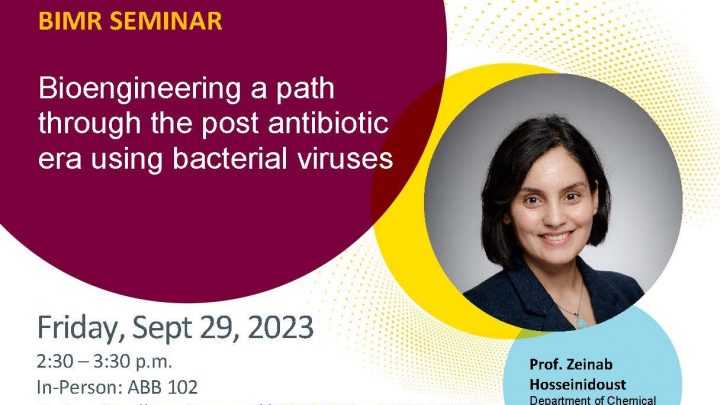Bioengineering a path through the post antibiotic era using bacterial viruses
Sep 29, 2023
2:30PM to 3:30PM

Date/Time
Date(s) - 29/09/2023
2:30 pm - 3:30 pm
Categories
Prof. Zeinab Hosseinidoust
Department of Chemical Engineering, McMaster University
Antimicrobial resistance is on its way to becoming the next global pandemic. Bacteriophages (bacterial viruses) may be our last beacon of hope in the fight against antibiotic resistant bacterial infections. The use of bacteriophages as a therapeutic relies on century-old methods that, while adequate for phage research labs, fall short when a human life hangs in the balance. Design and administration of phage therapeutics requires a fundamental shift in the way we think about antimicrobial therapies and a collection of custom-designed tools and technologies that meet the standard of care in modern medicine. This is a unique challenge and open that requires the knowledge and skills of engineers. In my lab, we have made it our mission to address this challenge. I will present how we use tools of biomaterials engineering, surface/interfacial engineering, and particle engineering to fundamentally reimagine phages biobanks, phage stabilization, phage delivery, and phage screening. In addition, I will present our most recent tools and technologies that address major bottlenecks in real life application of phage, namely rapid screening, high throughput purification, preservation, and delivery (injectable and microgel, patch, surface functionalization, powder formation), and aerosolization.
Bio:
I am an associate professor in chemical and biomedical engineering and the Canada Research Chair in Bacteriophage Bioengineering. I obtained my PhD from McGill University with Dr. Nathalie Tufenkji (Tier 1 CRC in biocolloids) and Dr. Theo van de Ven (Sir William C. Macdonald Chair in Chemistry) and completed my postdoctoral training at the Max Planck Institute for Intelligent Systems in Stuttgart, Germany with Dr. Metin Sitti as a CIHR fellow. I obtained over 12 scholarships/fellowships and awards during my doctoral and postdoctoral training.
I joined the Chemical Engineering Department at McMaster University in July 2016. I am a core member of Farncombe Institute for Digestive Health and the Centre of Excellence for Protective Equipment and Materials, and an associate member of the School of Biomedical Engineering, Institute for Infectious Disease Research, David Braley Centre for Antibiotic Discovery. I am also an editorial board member for Scientific Reports and an associate editor for the Canadian Journal of Chemical Engineering and.
My research program focuses on responding to global biological threats using bacteriophages (bacterial viruses). Our focus is the threat of antibiotic-resistant bacterial infections and airborne viral infections. Patented technologies developed by my team at McMaster have gained recognition from academia, industry, Health Canada, and public media. We develop phage-built bio-inks, hydrogels, microgels, surface coatings, scaffolds, and spray-dried powders, as well as phage-based assays and in vitro and in vivo models for phage therapy. My team also works on aerosolized phage delivery as part of our award-winning bio-aerosols platform. As part of this research, I collaborate closely with the Canadian Standards Association (CSA) and served a members of the CSA standard development committee Z94.4.1 for developing the first Canadian standard for respirators. I am also a member of the Canadian Committee on Indoor Air Quality (CCIAQ).
In-Person: ABB 102
Online: https://mcmaster.zoom.us/j/94476117108?pwd=MW9qUzRNV2ZoWG1zVGlFQ1I3aGxXQT09

